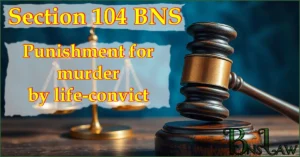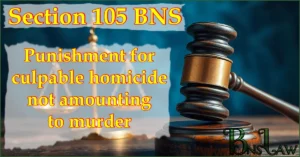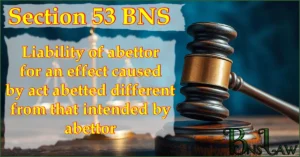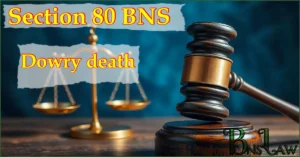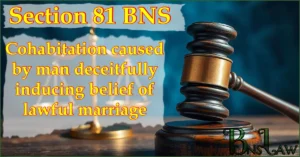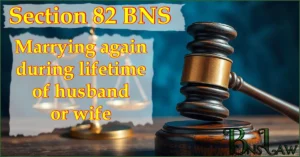Section 111 BNS | BNS 111 | Organised Crime
111(1) BNS
Any continuing unlawful activity including kidnapping, robbery, vehicle theft, extortion, land grabbing, contract killing, economic offence, cyber-crimes, trafficking of persons, drugs, weapons or illicit goods or services, human trafficking for prostitution or ransom, by any person or a group of persons acting in concert, singly or jointly, either as a member of an organised crime syndicate or on behalf of such syndicate, by use of violence, threat of violence, intimidation, coercion, or by any other unlawful means to obtain direct or indirect material benefit including a financial benefit, shall constitute organised crime.
Explanation— For the purposes of this sub-section:
(i) “organised crime syndicate” means a group of two or more persons who, acting either singly or jointly, as a syndicate or gang indulge in any continuing unlawful activity;
(ii) “continuing unlawful activity” means an activity prohibited by law which is a cognizable offence punishable with imprisonment of three years or more, undertaken by any person, either singly or jointly, as a member of an organised crime syndicate or on behalf of such syndicate in respect of which more than one charge-sheets have been filed before a competent Court within the preceding period of ten years and that Court has taken cognizance of such offence, and includes economic offence;
(iii) “economic offence” includes criminal breach of trust, forgery, counterfeiting of currencynotes, bank-notes and Government stamps, hawala transaction, mass-marketing fraud or running any scheme to defraud several persons or doing any act in any manner with a view to defraud any bank or financial institution or any other institution or organisation for obtaining monetary benefits in any form.
111(2) BNS
Whoever commits organised crime shall,—
(a) if such offence has resulted in the death of any person, be punished with death or imprisonment for life, and shall also be liable to fine which shall not be less than ten lakh rupees;
(b) in any other case, be punished with imprisonment for a term which shall not be less than five years but which may extend to imprisonment for life, and shall also be liable to fine which shall not be less than five lakh rupees.
111(3) BNS
Whoever abets, attempts, conspires or knowingly facilitates the commission of an organised crime, or otherwise engages in any act preparatory to an organised crime, shall be punished with imprisonment for a term which shall not be less than five years but which may extend to imprisonment for life, and shall also be liable to fine which shall not be less than five lakh rupees.
111(4) BNS
Any person who is a member of an organised crime syndicate shall be punished with imprisonment for a term which shall not be less than five years but which may extend to imprisonment for life, and shall also be liable to fine which shall not be less than five lakh rupees.
111(5) BNS
Whoever, intentionally, harbours or conceals any person who has committed the offence of an organised crime shall be punished with imprisonment for a term which shall not be less than three years but which may extend to imprisonment for life, and shall also be liable to fine which shall not be less than five lakh rupees:
Provided that this sub-section shall not apply to any case in which the harbour or concealment is by the spouse of the offender.
111(6) BNS
Whoever possesses any property derived or obtained from the commission of an organised crime or proceeds of any organised crime or which has been acquired through the organised crime, shall be punishable with imprisonment for a term which shall not be less than three years but which may extend to imprisonment for life and shall also be liable to fine which shall not be less than two lakh rupees.
111(7) BNS
If any person on behalf of a member of an organised crime syndicate is, or at any time has been in possession of movable or immovable property which he cannot satisfactorily account for, shall be punishable with imprisonment for a term which shall not be less than three years but which may extend to imprisonment for ten years and shall also be liable to fine which shall not be less than one lakh rupees.
READ OTHER SECTIONS OF CHAPTER VI — OF OFFENCES AFFECTING THE HUMAN BODY
FAQs of BNS Section 111
-
111 BNS punishment and fine
Punishment and fine under Section 111 of the BNS—
BNS 111(2)(a): Death or imprisonment for life and fine of not less than 10 lakh rupees.
BNS 111(2)(b): Imprisonment for not less than 5 years but which may extend to imprisonment for life and fine of not less than 5 lakh rupees.
BNS 111(3): Imprisonment for not less than 5 years but which may extend to imprisonment for life and fine of not less than 5 lakh rupees.
BNS 111(4): Imprisonment for not less than 5 years but which may extend to imprisonment for life and fine of not less than 5 lakh rupees.
BNS 111(5): Imprisonment for not less than 3 years but which may extend to imprisonment for life and fine of not less than 5 lakh rupees.
BNS 111(6): Imprisonment for not less than 3 years but which may extend to imprisonment for life and fine of not less than 2 lakh rupees.
BNS 111(7): Imprisonment for not less than 3 years but which may extend to imprisonment for 10 years and fine of not less than 1 lakh rupees.
-
111 BNS cognizable or not
The offence under Section 111 of the BNS is cognizable.
-
111 BNS bailable or not
The offence under Section 111 of the BNS is non-bailable.
-
111 BNS trial court
Offence specified in Section 111 of the BNS is triable by the Court of Session.
Important Points
- Cognizable Offences: These are offences where a police officer can arrest a person without a warrant.
- Non-Cognizable Offences: These are offences where a police officer cannot arrest a person without a warrant.
- Bailable Offences: These are offences where the accused can get bail from the police station itself. All bailable offences are listed in the First Schedule of the Bharatiya Nagarik Suraksha Sanhita (BNSS).
- Non-Bailable Offences: Offences in which bail is not granted directly from the police station but after hearing the case in the court, the judge decides when bail will be granted. All non-bailable offences are listed in the first schedule of the Bharatiya Nagarik Suraksha Sanhita (BNSS).
- In the above FAQ, “trial court” means the court that has jurisdiction to try the offence.
- In the above FAQ, the expression “Magistrate of the first class” and “Any Magistrate” does not include Executive Magistrates.
Read other Sections of the BNS
Reference Link: New Criminal Laws (BNS), Ministry of Home Affairs


